Challenges in Preschool Education: Oral Language Skills in Sri Lanka
VerifiedAdded on 2023/06/17
|48
|14917
|403
Report
AI Summary
This report explores the challenges encountered by preschool teachers in the Batticaloa district of Sri Lanka in fostering oral language skills among young learners. It identifies key issues such as a lack of resources, the absence of a standardized curriculum, and insufficient training programs for teachers, all of which significantly impact children's language development. The report highlights the importance of early communication skills for social and educational development, noting that deficiencies can lead to behavioral problems and academic struggles. Through interviews with administrators, the study reveals disparities in resource availability between urban and rural preschools, the influence of home language on children's progress, and the need for technological aids to support children with physical disabilities. The report concludes with recommendations for addressing these challenges, including increased resource allocation, curriculum development, and comprehensive training programs for preschool teachers to improve the quality of early childhood education.

RESEARCH
Paraphrase This Document
Need a fresh take? Get an instant paraphrase of this document with our AI Paraphraser
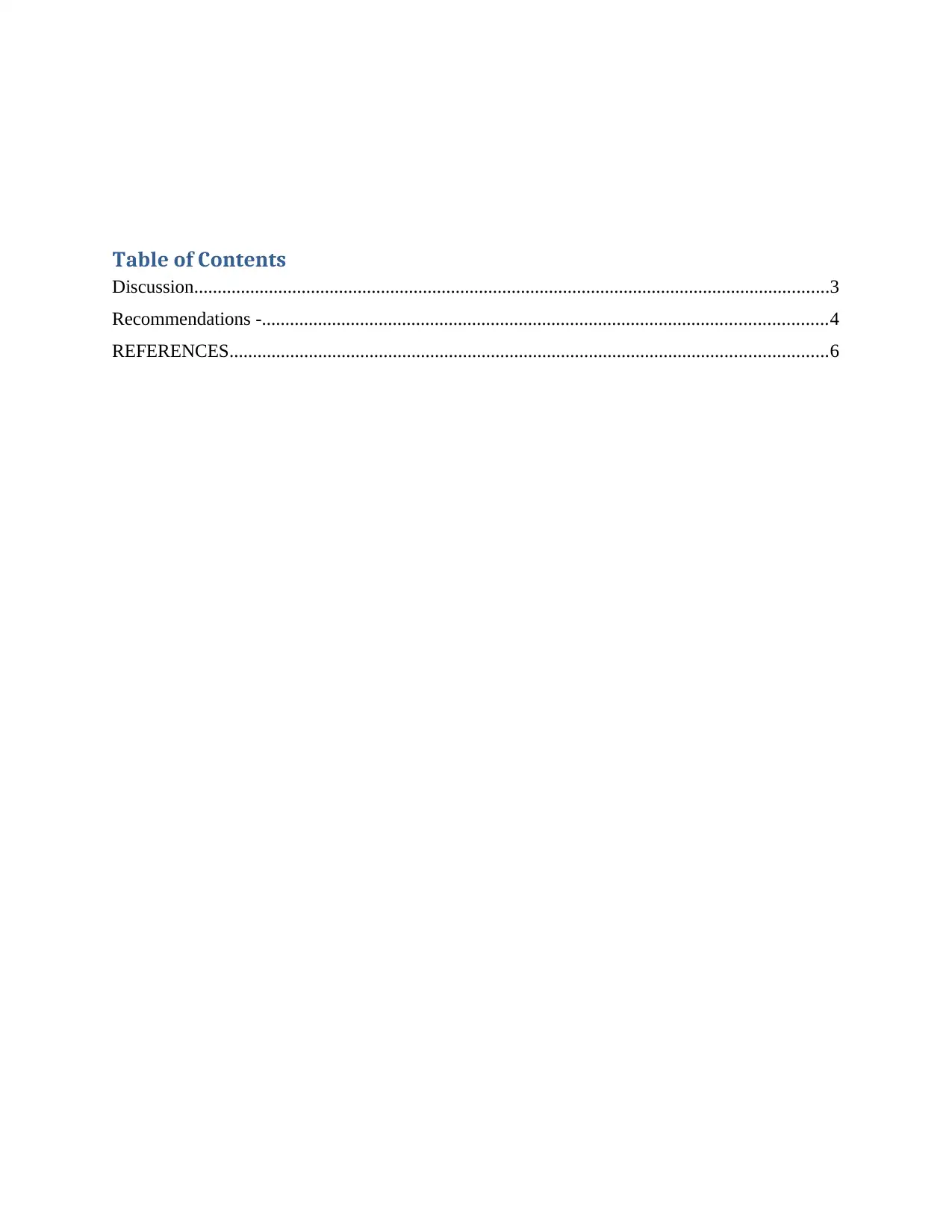
Table of Contents
Discussion........................................................................................................................................3
Recommendations -.........................................................................................................................4
REFERENCES................................................................................................................................6
Discussion........................................................................................................................................3
Recommendations -.........................................................................................................................4
REFERENCES................................................................................................................................6
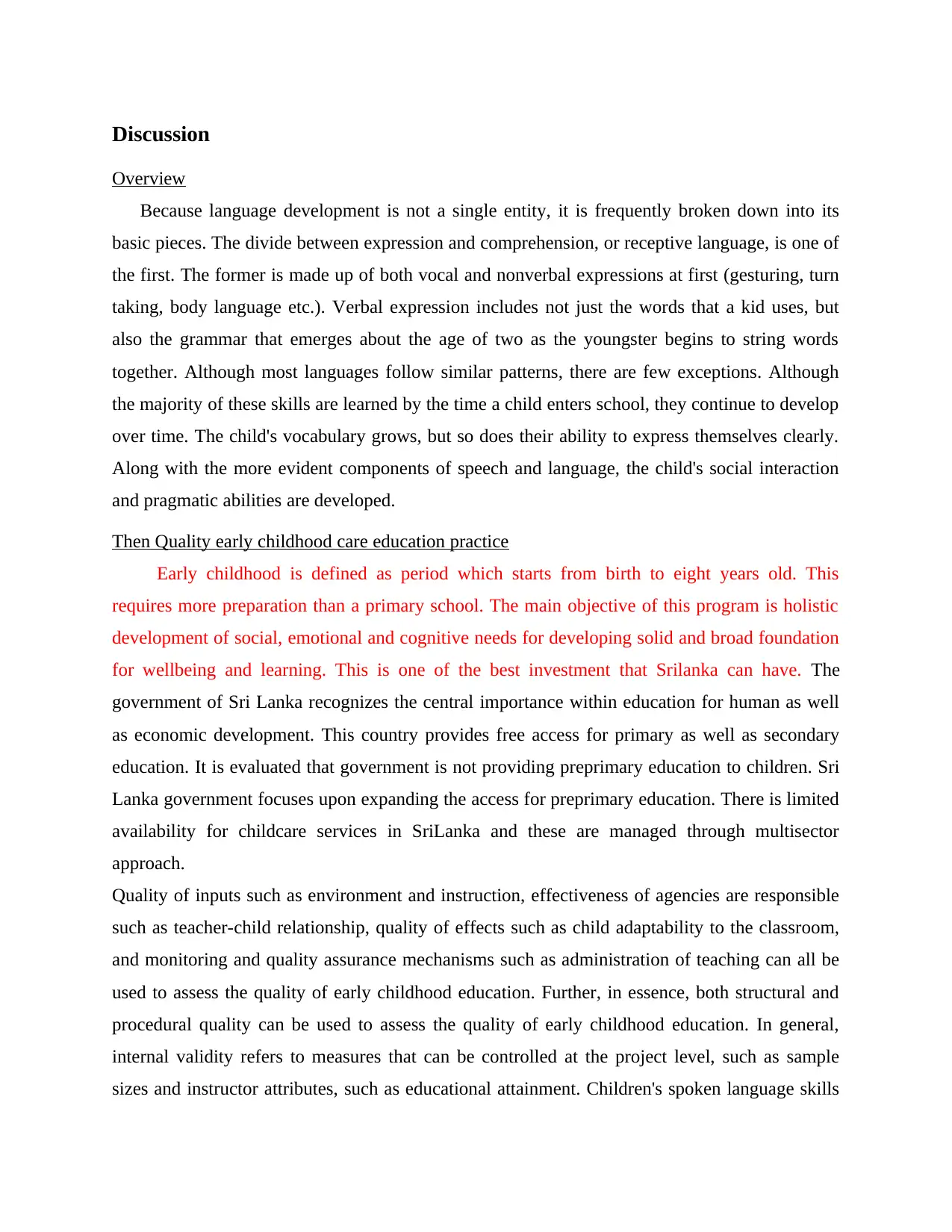
Discussion
Overview
Because language development is not a single entity, it is frequently broken down into its
basic pieces. The divide between expression and comprehension, or receptive language, is one of
the first. The former is made up of both vocal and nonverbal expressions at first (gesturing, turn
taking, body language etc.). Verbal expression includes not just the words that a kid uses, but
also the grammar that emerges about the age of two as the youngster begins to string words
together. Although most languages follow similar patterns, there are few exceptions. Although
the majority of these skills are learned by the time a child enters school, they continue to develop
over time. The child's vocabulary grows, but so does their ability to express themselves clearly.
Along with the more evident components of speech and language, the child's social interaction
and pragmatic abilities are developed.
Then Quality early childhood care education practice
Early childhood is defined as period which starts from birth to eight years old. This
requires more preparation than a primary school. The main objective of this program is holistic
development of social, emotional and cognitive needs for developing solid and broad foundation
for wellbeing and learning. This is one of the best investment that Srilanka can have. The
government of Sri Lanka recognizes the central importance within education for human as well
as economic development. This country provides free access for primary as well as secondary
education. It is evaluated that government is not providing preprimary education to children. Sri
Lanka government focuses upon expanding the access for preprimary education. There is limited
availability for childcare services in SriLanka and these are managed through multisector
approach.
Quality of inputs such as environment and instruction, effectiveness of agencies are responsible
such as teacher-child relationship, quality of effects such as child adaptability to the classroom,
and monitoring and quality assurance mechanisms such as administration of teaching can all be
used to assess the quality of early childhood education. Further, in essence, both structural and
procedural quality can be used to assess the quality of early childhood education. In general,
internal validity refers to measures that can be controlled at the project level, such as sample
sizes and instructor attributes, such as educational attainment. Children's spoken language skills
Overview
Because language development is not a single entity, it is frequently broken down into its
basic pieces. The divide between expression and comprehension, or receptive language, is one of
the first. The former is made up of both vocal and nonverbal expressions at first (gesturing, turn
taking, body language etc.). Verbal expression includes not just the words that a kid uses, but
also the grammar that emerges about the age of two as the youngster begins to string words
together. Although most languages follow similar patterns, there are few exceptions. Although
the majority of these skills are learned by the time a child enters school, they continue to develop
over time. The child's vocabulary grows, but so does their ability to express themselves clearly.
Along with the more evident components of speech and language, the child's social interaction
and pragmatic abilities are developed.
Then Quality early childhood care education practice
Early childhood is defined as period which starts from birth to eight years old. This
requires more preparation than a primary school. The main objective of this program is holistic
development of social, emotional and cognitive needs for developing solid and broad foundation
for wellbeing and learning. This is one of the best investment that Srilanka can have. The
government of Sri Lanka recognizes the central importance within education for human as well
as economic development. This country provides free access for primary as well as secondary
education. It is evaluated that government is not providing preprimary education to children. Sri
Lanka government focuses upon expanding the access for preprimary education. There is limited
availability for childcare services in SriLanka and these are managed through multisector
approach.
Quality of inputs such as environment and instruction, effectiveness of agencies are responsible
such as teacher-child relationship, quality of effects such as child adaptability to the classroom,
and monitoring and quality assurance mechanisms such as administration of teaching can all be
used to assess the quality of early childhood education. Further, in essence, both structural and
procedural quality can be used to assess the quality of early childhood education. In general,
internal validity refers to measures that can be controlled at the project level, such as sample
sizes and instructor attributes, such as educational attainment. Children's spoken language skills
⊘ This is a preview!⊘
Do you want full access?
Subscribe today to unlock all pages.

Trusted by 1+ million students worldwide
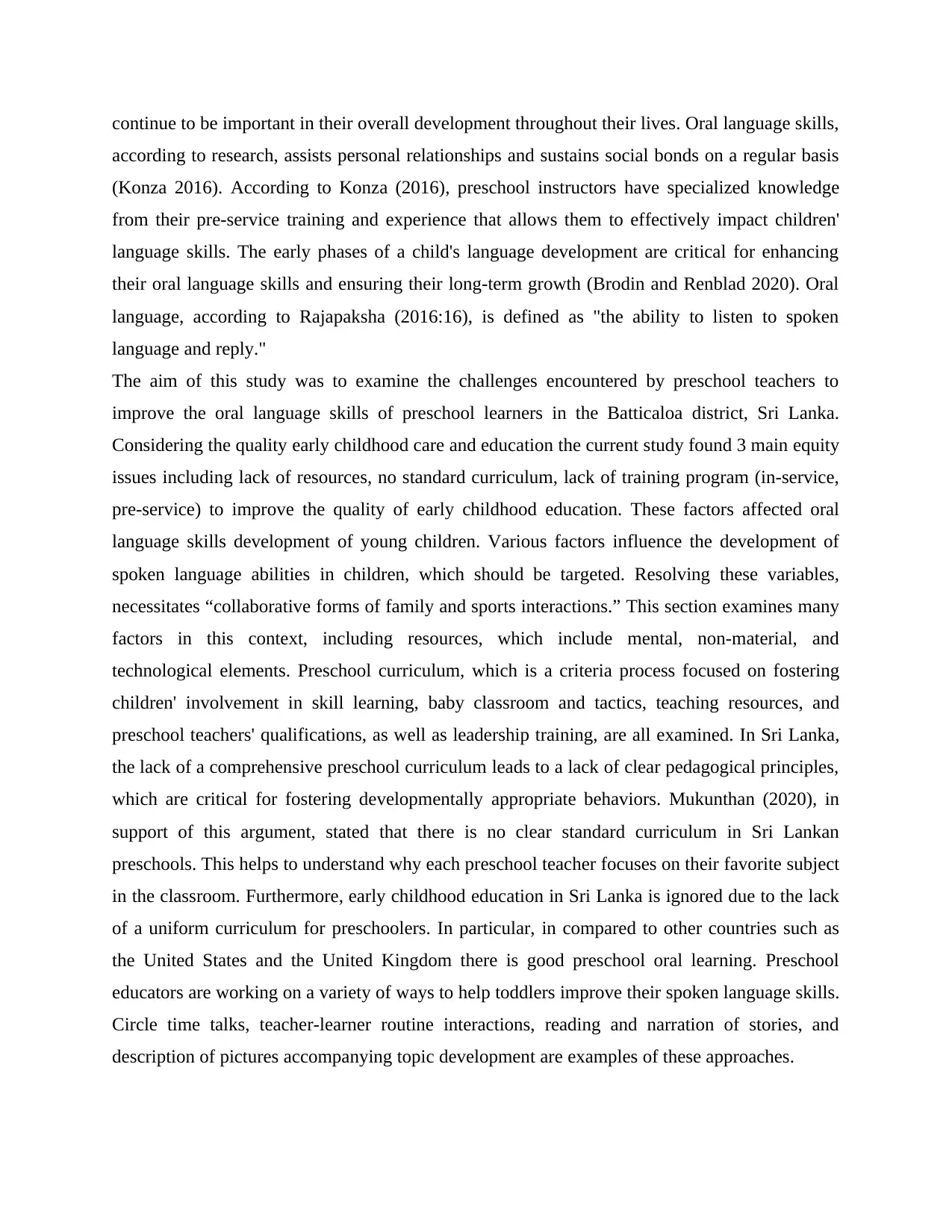
continue to be important in their overall development throughout their lives. Oral language skills,
according to research, assists personal relationships and sustains social bonds on a regular basis
(Konza 2016). According to Konza (2016), preschool instructors have specialized knowledge
from their pre-service training and experience that allows them to effectively impact children'
language skills. The early phases of a child's language development are critical for enhancing
their oral language skills and ensuring their long-term growth (Brodin and Renblad 2020). Oral
language, according to Rajapaksha (2016:16), is defined as "the ability to listen to spoken
language and reply."
The aim of this study was to examine the challenges encountered by preschool teachers to
improve the oral language skills of preschool learners in the Batticaloa district, Sri Lanka.
Considering the quality early childhood care and education the current study found 3 main equity
issues including lack of resources, no standard curriculum, lack of training program (in-service,
pre-service) to improve the quality of early childhood education. These factors affected oral
language skills development of young children. Various factors influence the development of
spoken language abilities in children, which should be targeted. Resolving these variables,
necessitates “collaborative forms of family and sports interactions.” This section examines many
factors in this context, including resources, which include mental, non-material, and
technological elements. Preschool curriculum, which is a criteria process focused on fostering
children' involvement in skill learning, baby classroom and tactics, teaching resources, and
preschool teachers' qualifications, as well as leadership training, are all examined. In Sri Lanka,
the lack of a comprehensive preschool curriculum leads to a lack of clear pedagogical principles,
which are critical for fostering developmentally appropriate behaviors. Mukunthan (2020), in
support of this argument, stated that there is no clear standard curriculum in Sri Lankan
preschools. This helps to understand why each preschool teacher focuses on their favorite subject
in the classroom. Furthermore, early childhood education in Sri Lanka is ignored due to the lack
of a uniform curriculum for preschoolers. In particular, in compared to other countries such as
the United States and the United Kingdom there is good preschool oral learning. Preschool
educators are working on a variety of ways to help toddlers improve their spoken language skills.
Circle time talks, teacher-learner routine interactions, reading and narration of stories, and
description of pictures accompanying topic development are examples of these approaches.
according to research, assists personal relationships and sustains social bonds on a regular basis
(Konza 2016). According to Konza (2016), preschool instructors have specialized knowledge
from their pre-service training and experience that allows them to effectively impact children'
language skills. The early phases of a child's language development are critical for enhancing
their oral language skills and ensuring their long-term growth (Brodin and Renblad 2020). Oral
language, according to Rajapaksha (2016:16), is defined as "the ability to listen to spoken
language and reply."
The aim of this study was to examine the challenges encountered by preschool teachers to
improve the oral language skills of preschool learners in the Batticaloa district, Sri Lanka.
Considering the quality early childhood care and education the current study found 3 main equity
issues including lack of resources, no standard curriculum, lack of training program (in-service,
pre-service) to improve the quality of early childhood education. These factors affected oral
language skills development of young children. Various factors influence the development of
spoken language abilities in children, which should be targeted. Resolving these variables,
necessitates “collaborative forms of family and sports interactions.” This section examines many
factors in this context, including resources, which include mental, non-material, and
technological elements. Preschool curriculum, which is a criteria process focused on fostering
children' involvement in skill learning, baby classroom and tactics, teaching resources, and
preschool teachers' qualifications, as well as leadership training, are all examined. In Sri Lanka,
the lack of a comprehensive preschool curriculum leads to a lack of clear pedagogical principles,
which are critical for fostering developmentally appropriate behaviors. Mukunthan (2020), in
support of this argument, stated that there is no clear standard curriculum in Sri Lankan
preschools. This helps to understand why each preschool teacher focuses on their favorite subject
in the classroom. Furthermore, early childhood education in Sri Lanka is ignored due to the lack
of a uniform curriculum for preschoolers. In particular, in compared to other countries such as
the United States and the United Kingdom there is good preschool oral learning. Preschool
educators are working on a variety of ways to help toddlers improve their spoken language skills.
Circle time talks, teacher-learner routine interactions, reading and narration of stories, and
description of pictures accompanying topic development are examples of these approaches.
Paraphrase This Document
Need a fresh take? Get an instant paraphrase of this document with our AI Paraphraser
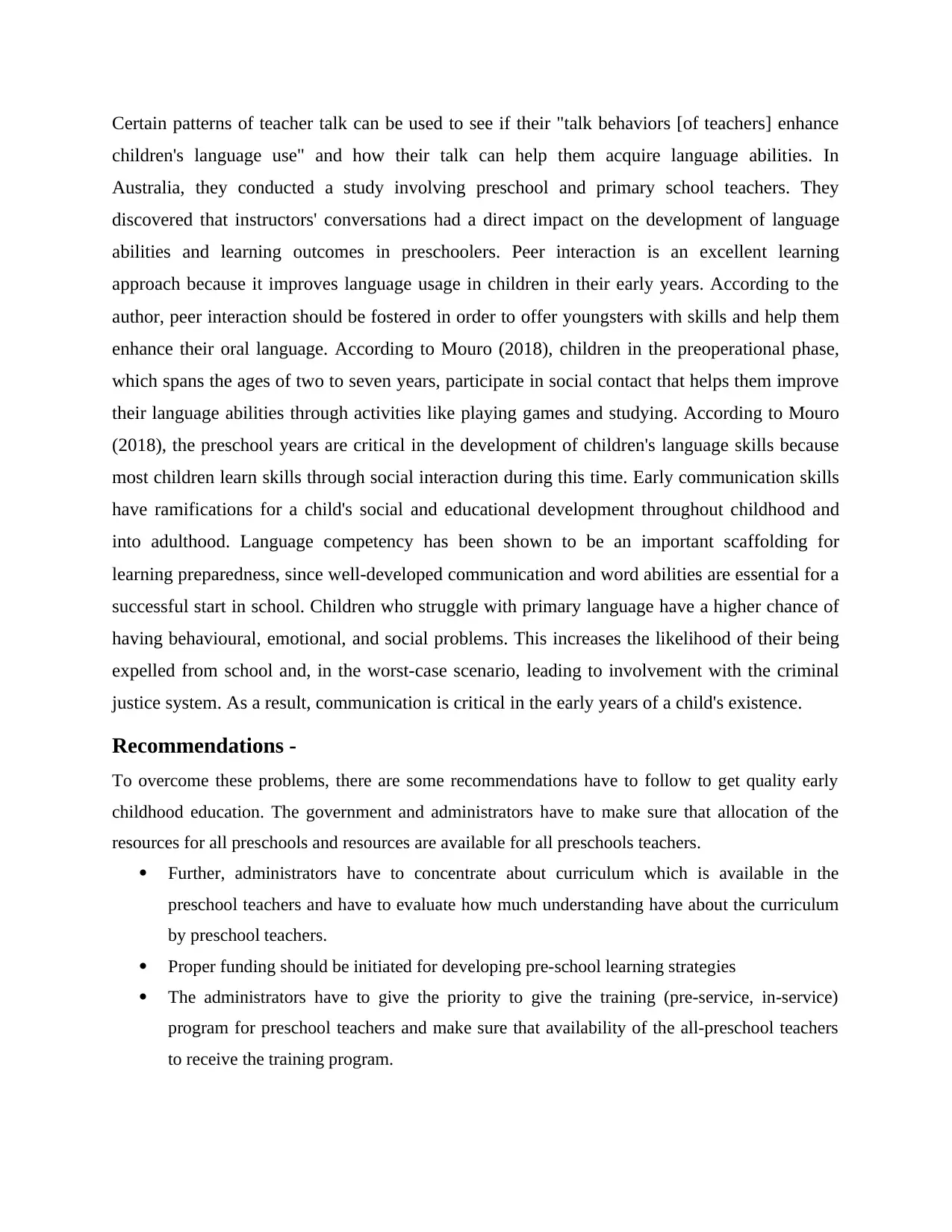
Certain patterns of teacher talk can be used to see if their "talk behaviors [of teachers] enhance
children's language use" and how their talk can help them acquire language abilities. In
Australia, they conducted a study involving preschool and primary school teachers. They
discovered that instructors' conversations had a direct impact on the development of language
abilities and learning outcomes in preschoolers. Peer interaction is an excellent learning
approach because it improves language usage in children in their early years. According to the
author, peer interaction should be fostered in order to offer youngsters with skills and help them
enhance their oral language. According to Mouro (2018), children in the preoperational phase,
which spans the ages of two to seven years, participate in social contact that helps them improve
their language abilities through activities like playing games and studying. According to Mouro
(2018), the preschool years are critical in the development of children's language skills because
most children learn skills through social interaction during this time. Early communication skills
have ramifications for a child's social and educational development throughout childhood and
into adulthood. Language competency has been shown to be an important scaffolding for
learning preparedness, since well-developed communication and word abilities are essential for a
successful start in school. Children who struggle with primary language have a higher chance of
having behavioural, emotional, and social problems. This increases the likelihood of their being
expelled from school and, in the worst-case scenario, leading to involvement with the criminal
justice system. As a result, communication is critical in the early years of a child's existence.
Recommendations -
To overcome these problems, there are some recommendations have to follow to get quality early
childhood education. The government and administrators have to make sure that allocation of the
resources for all preschools and resources are available for all preschools teachers.
Further, administrators have to concentrate about curriculum which is available in the
preschool teachers and have to evaluate how much understanding have about the curriculum
by preschool teachers.
Proper funding should be initiated for developing pre-school learning strategies
The administrators have to give the priority to give the training (pre-service, in-service)
program for preschool teachers and make sure that availability of the all-preschool teachers
to receive the training program.
children's language use" and how their talk can help them acquire language abilities. In
Australia, they conducted a study involving preschool and primary school teachers. They
discovered that instructors' conversations had a direct impact on the development of language
abilities and learning outcomes in preschoolers. Peer interaction is an excellent learning
approach because it improves language usage in children in their early years. According to the
author, peer interaction should be fostered in order to offer youngsters with skills and help them
enhance their oral language. According to Mouro (2018), children in the preoperational phase,
which spans the ages of two to seven years, participate in social contact that helps them improve
their language abilities through activities like playing games and studying. According to Mouro
(2018), the preschool years are critical in the development of children's language skills because
most children learn skills through social interaction during this time. Early communication skills
have ramifications for a child's social and educational development throughout childhood and
into adulthood. Language competency has been shown to be an important scaffolding for
learning preparedness, since well-developed communication and word abilities are essential for a
successful start in school. Children who struggle with primary language have a higher chance of
having behavioural, emotional, and social problems. This increases the likelihood of their being
expelled from school and, in the worst-case scenario, leading to involvement with the criminal
justice system. As a result, communication is critical in the early years of a child's existence.
Recommendations -
To overcome these problems, there are some recommendations have to follow to get quality early
childhood education. The government and administrators have to make sure that allocation of the
resources for all preschools and resources are available for all preschools teachers.
Further, administrators have to concentrate about curriculum which is available in the
preschool teachers and have to evaluate how much understanding have about the curriculum
by preschool teachers.
Proper funding should be initiated for developing pre-school learning strategies
The administrators have to give the priority to give the training (pre-service, in-service)
program for preschool teachers and make sure that availability of the all-preschool teachers
to receive the training program.
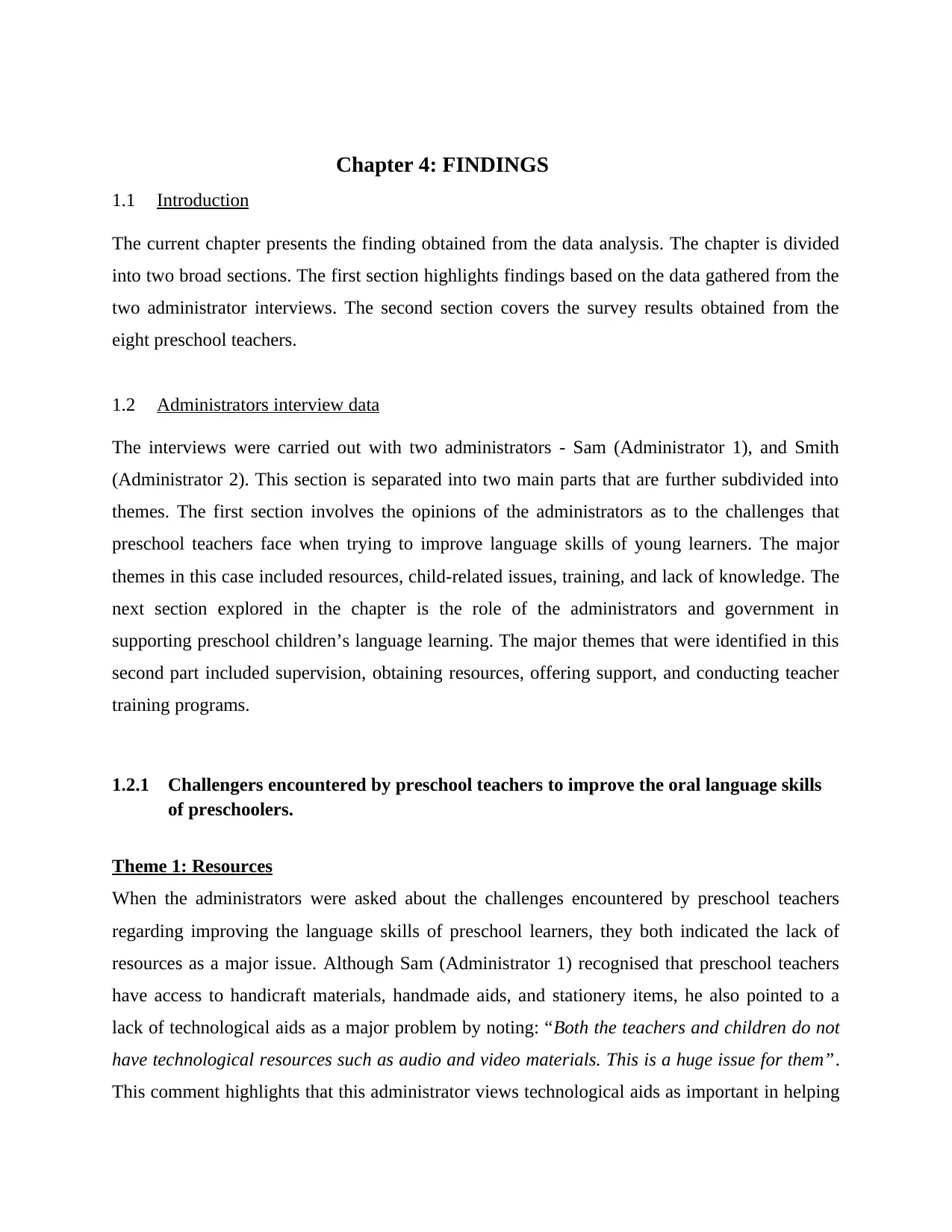
Chapter 4: FINDINGS
1.1 Introduction
The current chapter presents the finding obtained from the data analysis. The chapter is divided
into two broad sections. The first section highlights findings based on the data gathered from the
two administrator interviews. The second section covers the survey results obtained from the
eight preschool teachers.
1.2 Administrators interview data
The interviews were carried out with two administrators - Sam (Administrator 1), and Smith
(Administrator 2). This section is separated into two main parts that are further subdivided into
themes. The first section involves the opinions of the administrators as to the challenges that
preschool teachers face when trying to improve language skills of young learners. The major
themes in this case included resources, child-related issues, training, and lack of knowledge. The
next section explored in the chapter is the role of the administrators and government in
supporting preschool children’s language learning. The major themes that were identified in this
second part included supervision, obtaining resources, offering support, and conducting teacher
training programs.
1.2.1 Challengers encountered by preschool teachers to improve the oral language skills
of preschoolers.
Theme 1: Resources
When the administrators were asked about the challenges encountered by preschool teachers
regarding improving the language skills of preschool learners, they both indicated the lack of
resources as a major issue. Although Sam (Administrator 1) recognised that preschool teachers
have access to handicraft materials, handmade aids, and stationery items, he also pointed to a
lack of technological aids as a major problem by noting: “Both the teachers and children do not
have technological resources such as audio and video materials. This is a huge issue for them”.
This comment highlights that this administrator views technological aids as important in helping
1.1 Introduction
The current chapter presents the finding obtained from the data analysis. The chapter is divided
into two broad sections. The first section highlights findings based on the data gathered from the
two administrator interviews. The second section covers the survey results obtained from the
eight preschool teachers.
1.2 Administrators interview data
The interviews were carried out with two administrators - Sam (Administrator 1), and Smith
(Administrator 2). This section is separated into two main parts that are further subdivided into
themes. The first section involves the opinions of the administrators as to the challenges that
preschool teachers face when trying to improve language skills of young learners. The major
themes in this case included resources, child-related issues, training, and lack of knowledge. The
next section explored in the chapter is the role of the administrators and government in
supporting preschool children’s language learning. The major themes that were identified in this
second part included supervision, obtaining resources, offering support, and conducting teacher
training programs.
1.2.1 Challengers encountered by preschool teachers to improve the oral language skills
of preschoolers.
Theme 1: Resources
When the administrators were asked about the challenges encountered by preschool teachers
regarding improving the language skills of preschool learners, they both indicated the lack of
resources as a major issue. Although Sam (Administrator 1) recognised that preschool teachers
have access to handicraft materials, handmade aids, and stationery items, he also pointed to a
lack of technological aids as a major problem by noting: “Both the teachers and children do not
have technological resources such as audio and video materials. This is a huge issue for them”.
This comment highlights that this administrator views technological aids as important in helping
⊘ This is a preview!⊘
Do you want full access?
Subscribe today to unlock all pages.

Trusted by 1+ million students worldwide
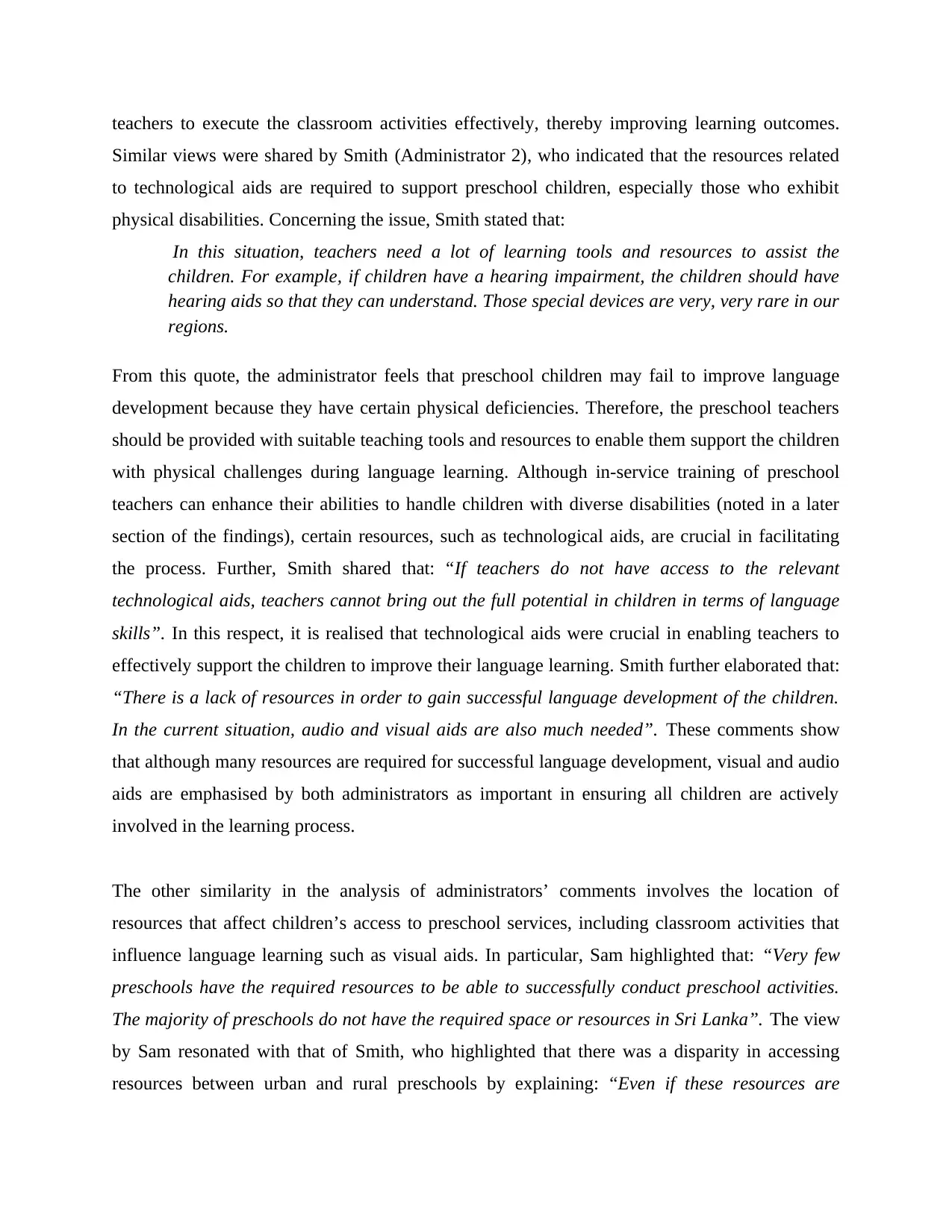
teachers to execute the classroom activities effectively, thereby improving learning outcomes.
Similar views were shared by Smith (Administrator 2), who indicated that the resources related
to technological aids are required to support preschool children, especially those who exhibit
physical disabilities. Concerning the issue, Smith stated that:
In this situation, teachers need a lot of learning tools and resources to assist the
children. For example, if children have a hearing impairment, the children should have
hearing aids so that they can understand. Those special devices are very, very rare in our
regions.
From this quote, the administrator feels that preschool children may fail to improve language
development because they have certain physical deficiencies. Therefore, the preschool teachers
should be provided with suitable teaching tools and resources to enable them support the children
with physical challenges during language learning. Although in-service training of preschool
teachers can enhance their abilities to handle children with diverse disabilities (noted in a later
section of the findings), certain resources, such as technological aids, are crucial in facilitating
the process. Further, Smith shared that: “If teachers do not have access to the relevant
technological aids, teachers cannot bring out the full potential in children in terms of language
skills”. In this respect, it is realised that technological aids were crucial in enabling teachers to
effectively support the children to improve their language learning. Smith further elaborated that:
“There is a lack of resources in order to gain successful language development of the children.
In the current situation, audio and visual aids are also much needed”. These comments show
that although many resources are required for successful language development, visual and audio
aids are emphasised by both administrators as important in ensuring all children are actively
involved in the learning process.
The other similarity in the analysis of administrators’ comments involves the location of
resources that affect children’s access to preschool services, including classroom activities that
influence language learning such as visual aids. In particular, Sam highlighted that: “Very few
preschools have the required resources to be able to successfully conduct preschool activities.
The majority of preschools do not have the required space or resources in Sri Lanka”. The view
by Sam resonated with that of Smith, who highlighted that there was a disparity in accessing
resources between urban and rural preschools by explaining: “Even if these resources are
Similar views were shared by Smith (Administrator 2), who indicated that the resources related
to technological aids are required to support preschool children, especially those who exhibit
physical disabilities. Concerning the issue, Smith stated that:
In this situation, teachers need a lot of learning tools and resources to assist the
children. For example, if children have a hearing impairment, the children should have
hearing aids so that they can understand. Those special devices are very, very rare in our
regions.
From this quote, the administrator feels that preschool children may fail to improve language
development because they have certain physical deficiencies. Therefore, the preschool teachers
should be provided with suitable teaching tools and resources to enable them support the children
with physical challenges during language learning. Although in-service training of preschool
teachers can enhance their abilities to handle children with diverse disabilities (noted in a later
section of the findings), certain resources, such as technological aids, are crucial in facilitating
the process. Further, Smith shared that: “If teachers do not have access to the relevant
technological aids, teachers cannot bring out the full potential in children in terms of language
skills”. In this respect, it is realised that technological aids were crucial in enabling teachers to
effectively support the children to improve their language learning. Smith further elaborated that:
“There is a lack of resources in order to gain successful language development of the children.
In the current situation, audio and visual aids are also much needed”. These comments show
that although many resources are required for successful language development, visual and audio
aids are emphasised by both administrators as important in ensuring all children are actively
involved in the learning process.
The other similarity in the analysis of administrators’ comments involves the location of
resources that affect children’s access to preschool services, including classroom activities that
influence language learning such as visual aids. In particular, Sam highlighted that: “Very few
preschools have the required resources to be able to successfully conduct preschool activities.
The majority of preschools do not have the required space or resources in Sri Lanka”. The view
by Sam resonated with that of Smith, who highlighted that there was a disparity in accessing
resources between urban and rural preschools by explaining: “Even if these resources are
Paraphrase This Document
Need a fresh take? Get an instant paraphrase of this document with our AI Paraphraser
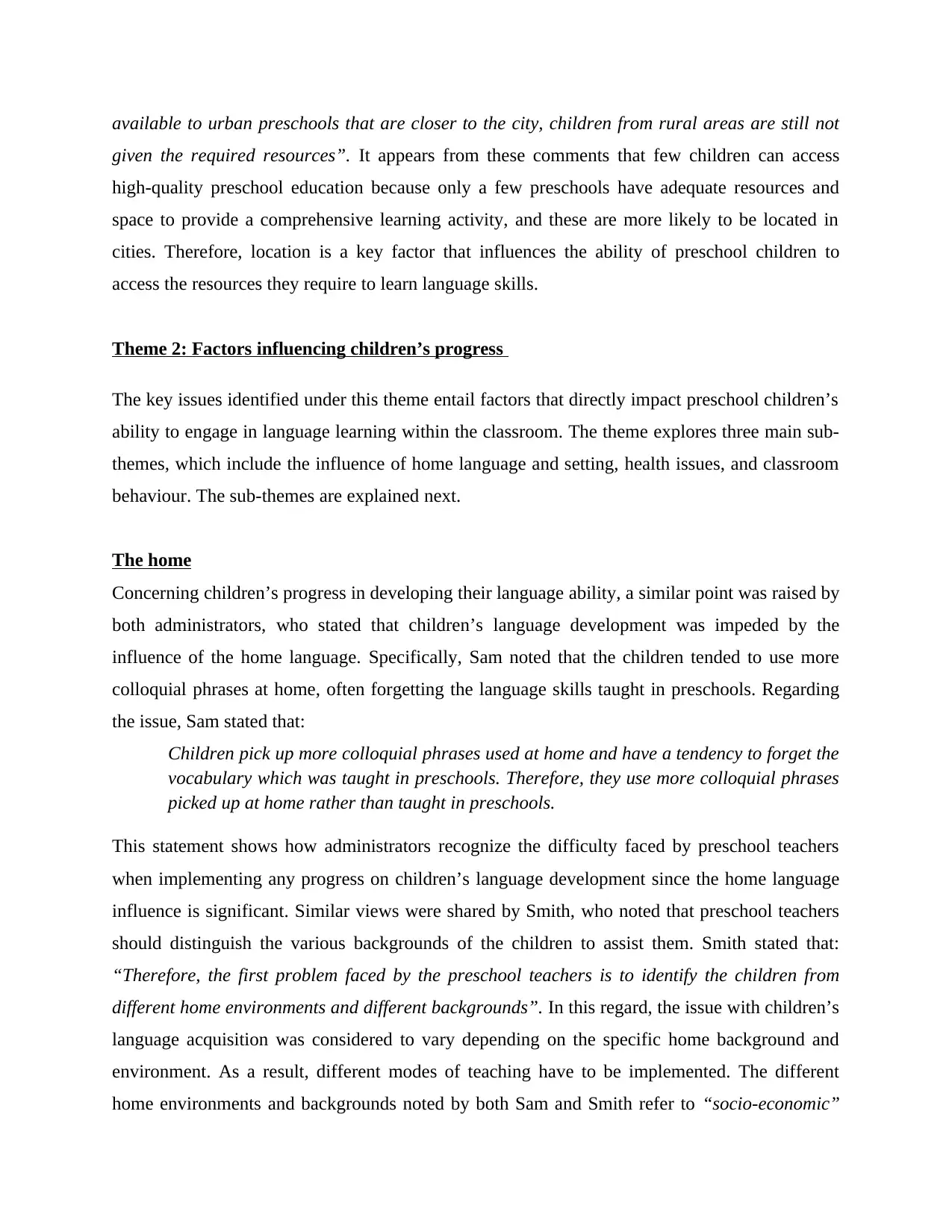
available to urban preschools that are closer to the city, children from rural areas are still not
given the required resources”. It appears from these comments that few children can access
high-quality preschool education because only a few preschools have adequate resources and
space to provide a comprehensive learning activity, and these are more likely to be located in
cities. Therefore, location is a key factor that influences the ability of preschool children to
access the resources they require to learn language skills.
Theme 2: Factors influencing children’s progress
The key issues identified under this theme entail factors that directly impact preschool children’s
ability to engage in language learning within the classroom. The theme explores three main sub-
themes, which include the influence of home language and setting, health issues, and classroom
behaviour. The sub-themes are explained next.
The home
Concerning children’s progress in developing their language ability, a similar point was raised by
both administrators, who stated that children’s language development was impeded by the
influence of the home language. Specifically, Sam noted that the children tended to use more
colloquial phrases at home, often forgetting the language skills taught in preschools. Regarding
the issue, Sam stated that:
Children pick up more colloquial phrases used at home and have a tendency to forget the
vocabulary which was taught in preschools. Therefore, they use more colloquial phrases
picked up at home rather than taught in preschools.
This statement shows how administrators recognize the difficulty faced by preschool teachers
when implementing any progress on children’s language development since the home language
influence is significant. Similar views were shared by Smith, who noted that preschool teachers
should distinguish the various backgrounds of the children to assist them. Smith stated that:
“Therefore, the first problem faced by the preschool teachers is to identify the children from
different home environments and different backgrounds”. In this regard, the issue with children’s
language acquisition was considered to vary depending on the specific home background and
environment. As a result, different modes of teaching have to be implemented. The different
home environments and backgrounds noted by both Sam and Smith refer to “socio-economic”
given the required resources”. It appears from these comments that few children can access
high-quality preschool education because only a few preschools have adequate resources and
space to provide a comprehensive learning activity, and these are more likely to be located in
cities. Therefore, location is a key factor that influences the ability of preschool children to
access the resources they require to learn language skills.
Theme 2: Factors influencing children’s progress
The key issues identified under this theme entail factors that directly impact preschool children’s
ability to engage in language learning within the classroom. The theme explores three main sub-
themes, which include the influence of home language and setting, health issues, and classroom
behaviour. The sub-themes are explained next.
The home
Concerning children’s progress in developing their language ability, a similar point was raised by
both administrators, who stated that children’s language development was impeded by the
influence of the home language. Specifically, Sam noted that the children tended to use more
colloquial phrases at home, often forgetting the language skills taught in preschools. Regarding
the issue, Sam stated that:
Children pick up more colloquial phrases used at home and have a tendency to forget the
vocabulary which was taught in preschools. Therefore, they use more colloquial phrases
picked up at home rather than taught in preschools.
This statement shows how administrators recognize the difficulty faced by preschool teachers
when implementing any progress on children’s language development since the home language
influence is significant. Similar views were shared by Smith, who noted that preschool teachers
should distinguish the various backgrounds of the children to assist them. Smith stated that:
“Therefore, the first problem faced by the preschool teachers is to identify the children from
different home environments and different backgrounds”. In this regard, the issue with children’s
language acquisition was considered to vary depending on the specific home background and
environment. As a result, different modes of teaching have to be implemented. The different
home environments and backgrounds noted by both Sam and Smith refer to “socio-economic”
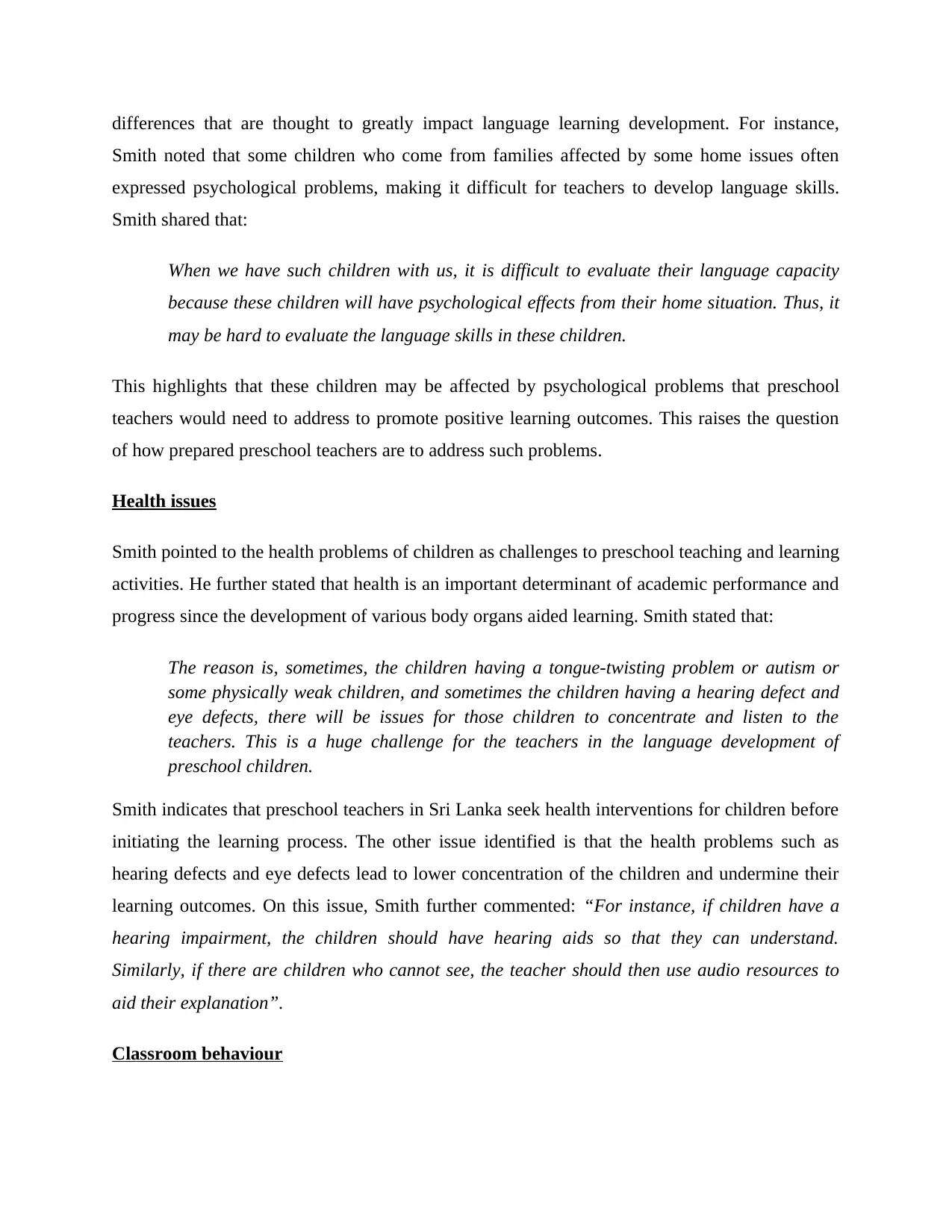
differences that are thought to greatly impact language learning development. For instance,
Smith noted that some children who come from families affected by some home issues often
expressed psychological problems, making it difficult for teachers to develop language skills.
Smith shared that:
When we have such children with us, it is difficult to evaluate their language capacity
because these children will have psychological effects from their home situation. Thus, it
may be hard to evaluate the language skills in these children.
This highlights that these children may be affected by psychological problems that preschool
teachers would need to address to promote positive learning outcomes. This raises the question
of how prepared preschool teachers are to address such problems.
Health issues
Smith pointed to the health problems of children as challenges to preschool teaching and learning
activities. He further stated that health is an important determinant of academic performance and
progress since the development of various body organs aided learning. Smith stated that:
The reason is, sometimes, the children having a tongue-twisting problem or autism or
some physically weak children, and sometimes the children having a hearing defect and
eye defects, there will be issues for those children to concentrate and listen to the
teachers. This is a huge challenge for the teachers in the language development of
preschool children.
Smith indicates that preschool teachers in Sri Lanka seek health interventions for children before
initiating the learning process. The other issue identified is that the health problems such as
hearing defects and eye defects lead to lower concentration of the children and undermine their
learning outcomes. On this issue, Smith further commented: “For instance, if children have a
hearing impairment, the children should have hearing aids so that they can understand.
Similarly, if there are children who cannot see, the teacher should then use audio resources to
aid their explanation”.
Classroom behaviour
Smith noted that some children who come from families affected by some home issues often
expressed psychological problems, making it difficult for teachers to develop language skills.
Smith shared that:
When we have such children with us, it is difficult to evaluate their language capacity
because these children will have psychological effects from their home situation. Thus, it
may be hard to evaluate the language skills in these children.
This highlights that these children may be affected by psychological problems that preschool
teachers would need to address to promote positive learning outcomes. This raises the question
of how prepared preschool teachers are to address such problems.
Health issues
Smith pointed to the health problems of children as challenges to preschool teaching and learning
activities. He further stated that health is an important determinant of academic performance and
progress since the development of various body organs aided learning. Smith stated that:
The reason is, sometimes, the children having a tongue-twisting problem or autism or
some physically weak children, and sometimes the children having a hearing defect and
eye defects, there will be issues for those children to concentrate and listen to the
teachers. This is a huge challenge for the teachers in the language development of
preschool children.
Smith indicates that preschool teachers in Sri Lanka seek health interventions for children before
initiating the learning process. The other issue identified is that the health problems such as
hearing defects and eye defects lead to lower concentration of the children and undermine their
learning outcomes. On this issue, Smith further commented: “For instance, if children have a
hearing impairment, the children should have hearing aids so that they can understand.
Similarly, if there are children who cannot see, the teacher should then use audio resources to
aid their explanation”.
Classroom behaviour
⊘ This is a preview!⊘
Do you want full access?
Subscribe today to unlock all pages.

Trusted by 1+ million students worldwide
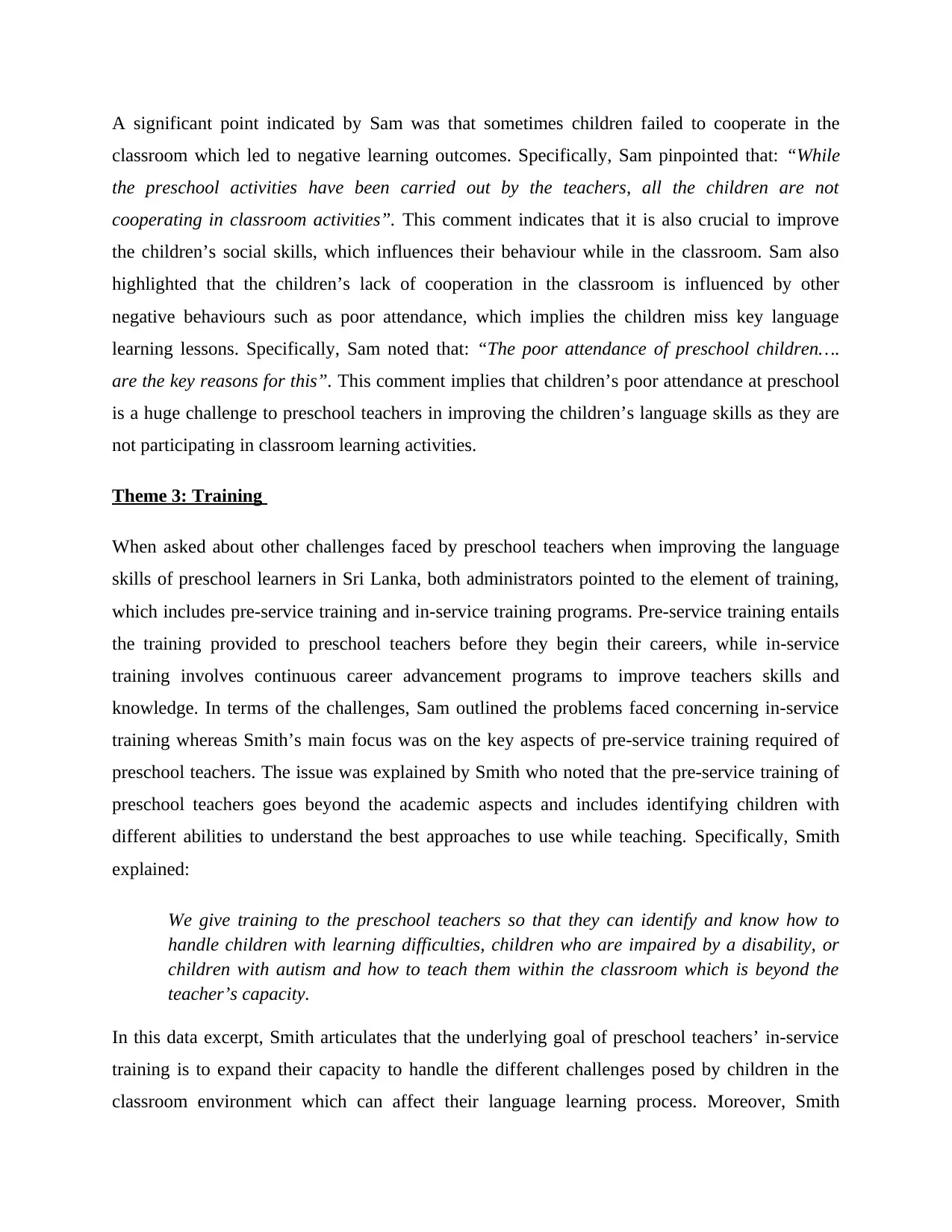
A significant point indicated by Sam was that sometimes children failed to cooperate in the
classroom which led to negative learning outcomes. Specifically, Sam pinpointed that: “While
the preschool activities have been carried out by the teachers, all the children are not
cooperating in classroom activities”. This comment indicates that it is also crucial to improve
the children’s social skills, which influences their behaviour while in the classroom. Sam also
highlighted that the children’s lack of cooperation in the classroom is influenced by other
negative behaviours such as poor attendance, which implies the children miss key language
learning lessons. Specifically, Sam noted that: “The poor attendance of preschool children….
are the key reasons for this”. This comment implies that children’s poor attendance at preschool
is a huge challenge to preschool teachers in improving the children’s language skills as they are
not participating in classroom learning activities.
Theme 3: Training
When asked about other challenges faced by preschool teachers when improving the language
skills of preschool learners in Sri Lanka, both administrators pointed to the element of training,
which includes pre-service training and in-service training programs. Pre-service training entails
the training provided to preschool teachers before they begin their careers, while in-service
training involves continuous career advancement programs to improve teachers skills and
knowledge. In terms of the challenges, Sam outlined the problems faced concerning in-service
training whereas Smith’s main focus was on the key aspects of pre-service training required of
preschool teachers. The issue was explained by Smith who noted that the pre-service training of
preschool teachers goes beyond the academic aspects and includes identifying children with
different abilities to understand the best approaches to use while teaching. Specifically, Smith
explained:
We give training to the preschool teachers so that they can identify and know how to
handle children with learning difficulties, children who are impaired by a disability, or
children with autism and how to teach them within the classroom which is beyond the
teacher’s capacity.
In this data excerpt, Smith articulates that the underlying goal of preschool teachers’ in-service
training is to expand their capacity to handle the different challenges posed by children in the
classroom environment which can affect their language learning process. Moreover, Smith
classroom which led to negative learning outcomes. Specifically, Sam pinpointed that: “While
the preschool activities have been carried out by the teachers, all the children are not
cooperating in classroom activities”. This comment indicates that it is also crucial to improve
the children’s social skills, which influences their behaviour while in the classroom. Sam also
highlighted that the children’s lack of cooperation in the classroom is influenced by other
negative behaviours such as poor attendance, which implies the children miss key language
learning lessons. Specifically, Sam noted that: “The poor attendance of preschool children….
are the key reasons for this”. This comment implies that children’s poor attendance at preschool
is a huge challenge to preschool teachers in improving the children’s language skills as they are
not participating in classroom learning activities.
Theme 3: Training
When asked about other challenges faced by preschool teachers when improving the language
skills of preschool learners in Sri Lanka, both administrators pointed to the element of training,
which includes pre-service training and in-service training programs. Pre-service training entails
the training provided to preschool teachers before they begin their careers, while in-service
training involves continuous career advancement programs to improve teachers skills and
knowledge. In terms of the challenges, Sam outlined the problems faced concerning in-service
training whereas Smith’s main focus was on the key aspects of pre-service training required of
preschool teachers. The issue was explained by Smith who noted that the pre-service training of
preschool teachers goes beyond the academic aspects and includes identifying children with
different abilities to understand the best approaches to use while teaching. Specifically, Smith
explained:
We give training to the preschool teachers so that they can identify and know how to
handle children with learning difficulties, children who are impaired by a disability, or
children with autism and how to teach them within the classroom which is beyond the
teacher’s capacity.
In this data excerpt, Smith articulates that the underlying goal of preschool teachers’ in-service
training is to expand their capacity to handle the different challenges posed by children in the
classroom environment which can affect their language learning process. Moreover, Smith
Paraphrase This Document
Need a fresh take? Get an instant paraphrase of this document with our AI Paraphraser
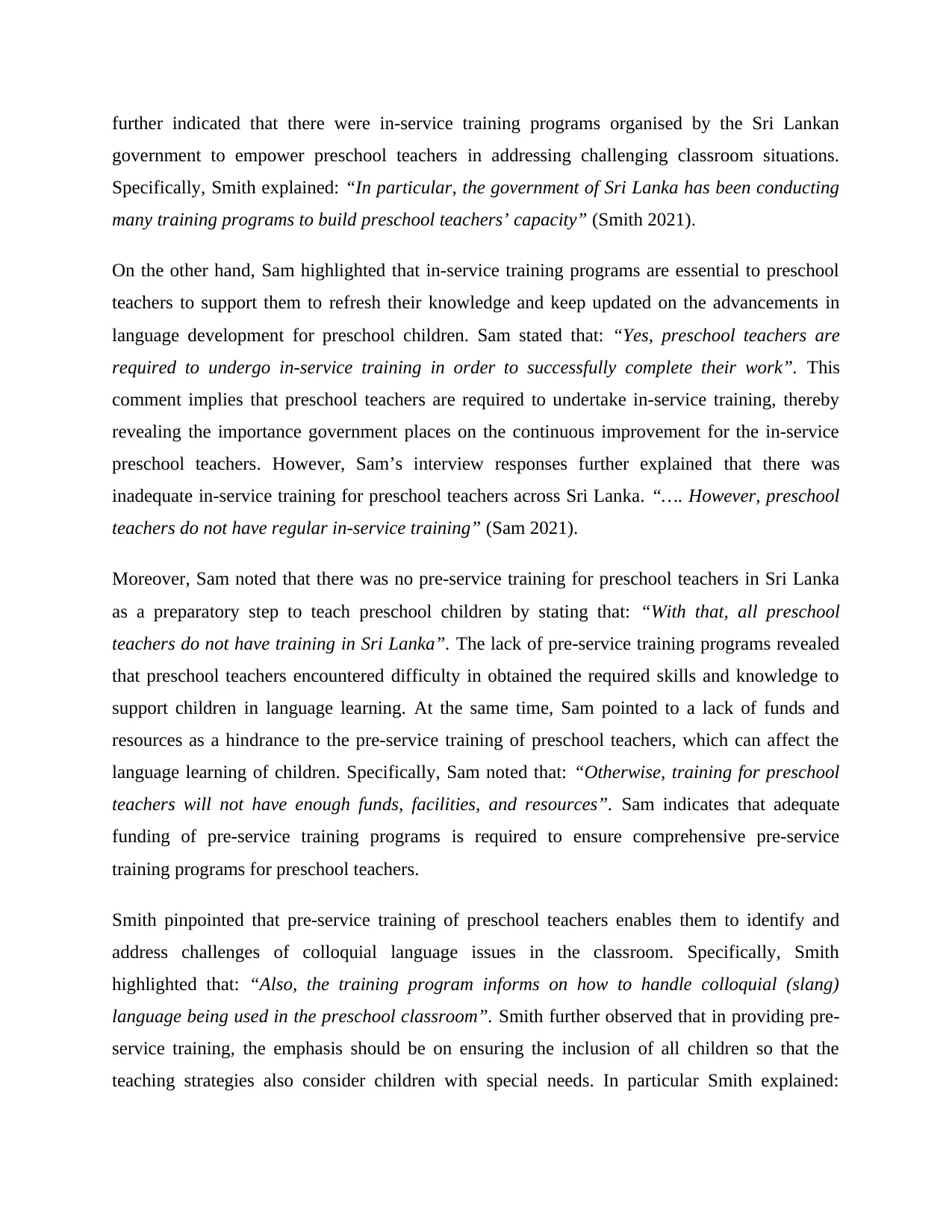
further indicated that there were in-service training programs organised by the Sri Lankan
government to empower preschool teachers in addressing challenging classroom situations.
Specifically, Smith explained: “In particular, the government of Sri Lanka has been conducting
many training programs to build preschool teachers’ capacity” (Smith 2021).
On the other hand, Sam highlighted that in-service training programs are essential to preschool
teachers to support them to refresh their knowledge and keep updated on the advancements in
language development for preschool children. Sam stated that: “Yes, preschool teachers are
required to undergo in-service training in order to successfully complete their work”. This
comment implies that preschool teachers are required to undertake in-service training, thereby
revealing the importance government places on the continuous improvement for the in-service
preschool teachers. However, Sam’s interview responses further explained that there was
inadequate in-service training for preschool teachers across Sri Lanka. “…. However, preschool
teachers do not have regular in-service training” (Sam 2021).
Moreover, Sam noted that there was no pre-service training for preschool teachers in Sri Lanka
as a preparatory step to teach preschool children by stating that: “With that, all preschool
teachers do not have training in Sri Lanka”. The lack of pre-service training programs revealed
that preschool teachers encountered difficulty in obtained the required skills and knowledge to
support children in language learning. At the same time, Sam pointed to a lack of funds and
resources as a hindrance to the pre-service training of preschool teachers, which can affect the
language learning of children. Specifically, Sam noted that: “Otherwise, training for preschool
teachers will not have enough funds, facilities, and resources”. Sam indicates that adequate
funding of pre-service training programs is required to ensure comprehensive pre-service
training programs for preschool teachers.
Smith pinpointed that pre-service training of preschool teachers enables them to identify and
address challenges of colloquial language issues in the classroom. Specifically, Smith
highlighted that: “Also, the training program informs on how to handle colloquial (slang)
language being used in the preschool classroom”. Smith further observed that in providing pre-
service training, the emphasis should be on ensuring the inclusion of all children so that the
teaching strategies also consider children with special needs. In particular Smith explained:
government to empower preschool teachers in addressing challenging classroom situations.
Specifically, Smith explained: “In particular, the government of Sri Lanka has been conducting
many training programs to build preschool teachers’ capacity” (Smith 2021).
On the other hand, Sam highlighted that in-service training programs are essential to preschool
teachers to support them to refresh their knowledge and keep updated on the advancements in
language development for preschool children. Sam stated that: “Yes, preschool teachers are
required to undergo in-service training in order to successfully complete their work”. This
comment implies that preschool teachers are required to undertake in-service training, thereby
revealing the importance government places on the continuous improvement for the in-service
preschool teachers. However, Sam’s interview responses further explained that there was
inadequate in-service training for preschool teachers across Sri Lanka. “…. However, preschool
teachers do not have regular in-service training” (Sam 2021).
Moreover, Sam noted that there was no pre-service training for preschool teachers in Sri Lanka
as a preparatory step to teach preschool children by stating that: “With that, all preschool
teachers do not have training in Sri Lanka”. The lack of pre-service training programs revealed
that preschool teachers encountered difficulty in obtained the required skills and knowledge to
support children in language learning. At the same time, Sam pointed to a lack of funds and
resources as a hindrance to the pre-service training of preschool teachers, which can affect the
language learning of children. Specifically, Sam noted that: “Otherwise, training for preschool
teachers will not have enough funds, facilities, and resources”. Sam indicates that adequate
funding of pre-service training programs is required to ensure comprehensive pre-service
training programs for preschool teachers.
Smith pinpointed that pre-service training of preschool teachers enables them to identify and
address challenges of colloquial language issues in the classroom. Specifically, Smith
highlighted that: “Also, the training program informs on how to handle colloquial (slang)
language being used in the preschool classroom”. Smith further observed that in providing pre-
service training, the emphasis should be on ensuring the inclusion of all children so that the
teaching strategies also consider children with special needs. In particular Smith explained:
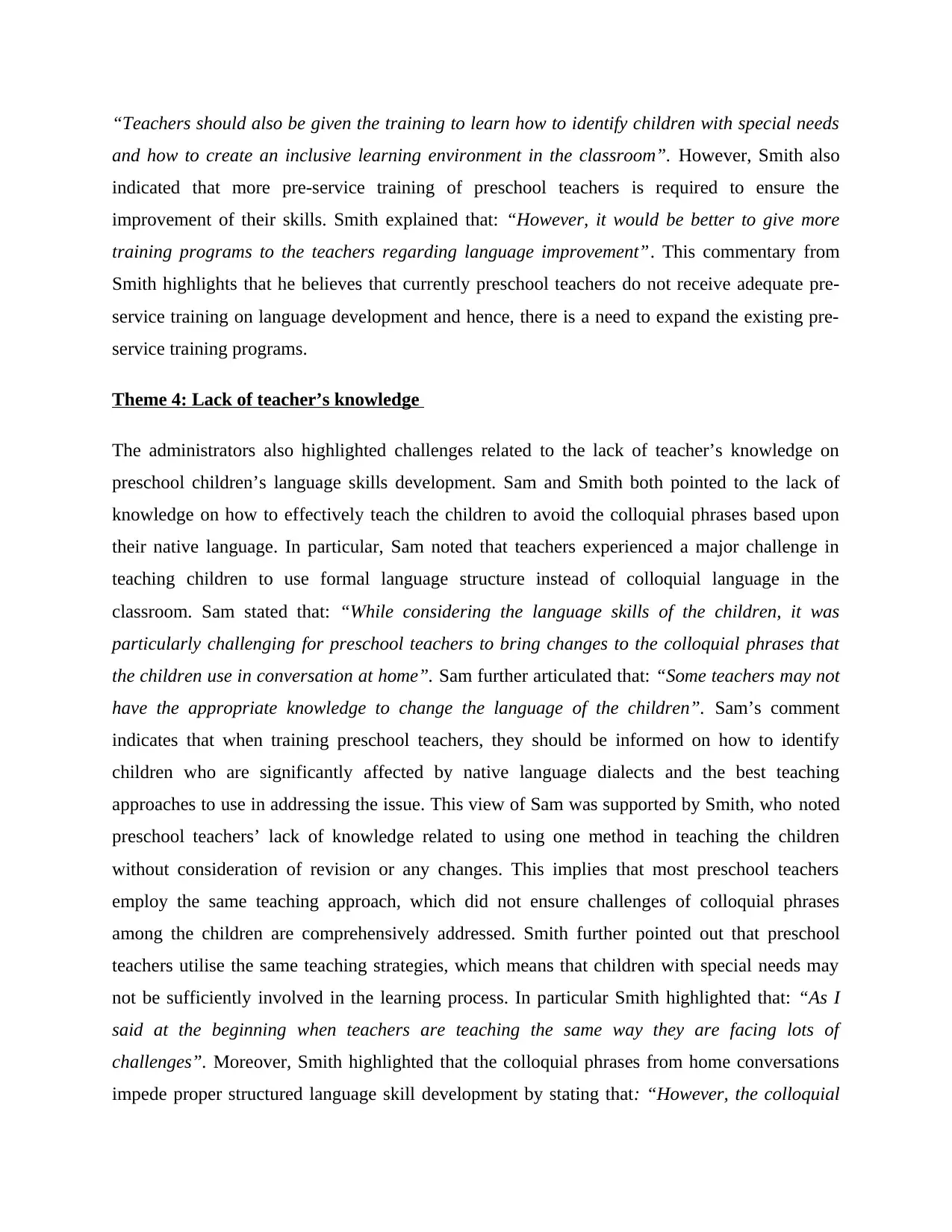
“Teachers should also be given the training to learn how to identify children with special needs
and how to create an inclusive learning environment in the classroom”. However, Smith also
indicated that more pre-service training of preschool teachers is required to ensure the
improvement of their skills. Smith explained that: “However, it would be better to give more
training programs to the teachers regarding language improvement”. This commentary from
Smith highlights that he believes that currently preschool teachers do not receive adequate pre-
service training on language development and hence, there is a need to expand the existing pre-
service training programs.
Theme 4: Lack of teacher’s knowledge
The administrators also highlighted challenges related to the lack of teacher’s knowledge on
preschool children’s language skills development. Sam and Smith both pointed to the lack of
knowledge on how to effectively teach the children to avoid the colloquial phrases based upon
their native language. In particular, Sam noted that teachers experienced a major challenge in
teaching children to use formal language structure instead of colloquial language in the
classroom. Sam stated that: “While considering the language skills of the children, it was
particularly challenging for preschool teachers to bring changes to the colloquial phrases that
the children use in conversation at home”. Sam further articulated that: “Some teachers may not
have the appropriate knowledge to change the language of the children”. Sam’s comment
indicates that when training preschool teachers, they should be informed on how to identify
children who are significantly affected by native language dialects and the best teaching
approaches to use in addressing the issue. This view of Sam was supported by Smith, who noted
preschool teachers’ lack of knowledge related to using one method in teaching the children
without consideration of revision or any changes. This implies that most preschool teachers
employ the same teaching approach, which did not ensure challenges of colloquial phrases
among the children are comprehensively addressed. Smith further pointed out that preschool
teachers utilise the same teaching strategies, which means that children with special needs may
not be sufficiently involved in the learning process. In particular Smith highlighted that: “As I
said at the beginning when teachers are teaching the same way they are facing lots of
challenges”. Moreover, Smith highlighted that the colloquial phrases from home conversations
impede proper structured language skill development by stating that: “However, the colloquial
and how to create an inclusive learning environment in the classroom”. However, Smith also
indicated that more pre-service training of preschool teachers is required to ensure the
improvement of their skills. Smith explained that: “However, it would be better to give more
training programs to the teachers regarding language improvement”. This commentary from
Smith highlights that he believes that currently preschool teachers do not receive adequate pre-
service training on language development and hence, there is a need to expand the existing pre-
service training programs.
Theme 4: Lack of teacher’s knowledge
The administrators also highlighted challenges related to the lack of teacher’s knowledge on
preschool children’s language skills development. Sam and Smith both pointed to the lack of
knowledge on how to effectively teach the children to avoid the colloquial phrases based upon
their native language. In particular, Sam noted that teachers experienced a major challenge in
teaching children to use formal language structure instead of colloquial language in the
classroom. Sam stated that: “While considering the language skills of the children, it was
particularly challenging for preschool teachers to bring changes to the colloquial phrases that
the children use in conversation at home”. Sam further articulated that: “Some teachers may not
have the appropriate knowledge to change the language of the children”. Sam’s comment
indicates that when training preschool teachers, they should be informed on how to identify
children who are significantly affected by native language dialects and the best teaching
approaches to use in addressing the issue. This view of Sam was supported by Smith, who noted
preschool teachers’ lack of knowledge related to using one method in teaching the children
without consideration of revision or any changes. This implies that most preschool teachers
employ the same teaching approach, which did not ensure challenges of colloquial phrases
among the children are comprehensively addressed. Smith further pointed out that preschool
teachers utilise the same teaching strategies, which means that children with special needs may
not be sufficiently involved in the learning process. In particular Smith highlighted that: “As I
said at the beginning when teachers are teaching the same way they are facing lots of
challenges”. Moreover, Smith highlighted that the colloquial phrases from home conversations
impede proper structured language skill development by stating that: “However, the colloquial
⊘ This is a preview!⊘
Do you want full access?
Subscribe today to unlock all pages.

Trusted by 1+ million students worldwide
1 out of 48
Related Documents
Your All-in-One AI-Powered Toolkit for Academic Success.
+13062052269
info@desklib.com
Available 24*7 on WhatsApp / Email
![[object Object]](/_next/static/media/star-bottom.7253800d.svg)
Unlock your academic potential
Copyright © 2020–2026 A2Z Services. All Rights Reserved. Developed and managed by ZUCOL.





